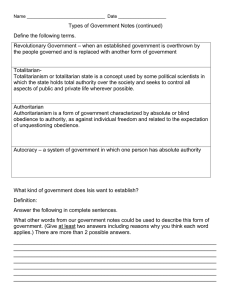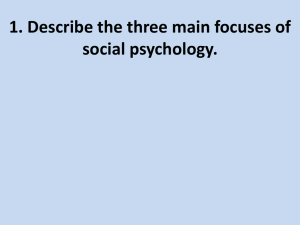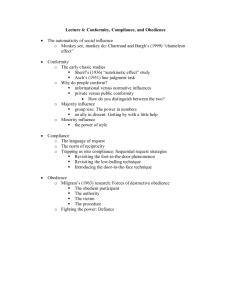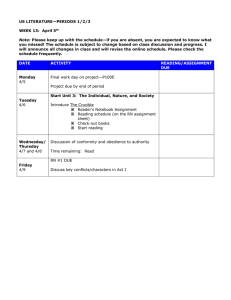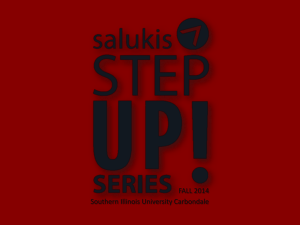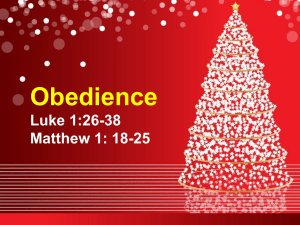P A Pattern of Integrity: Agency, Order, and Obedience Val Hawks
advertisement
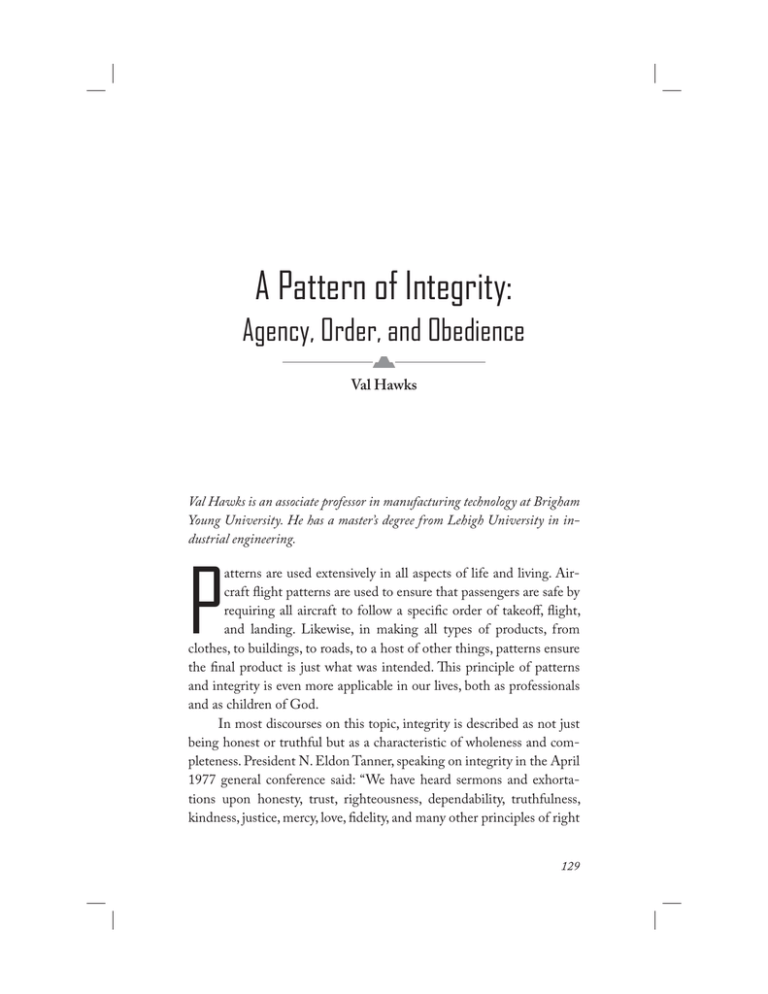
A Pattern of Integrity: Agency, Order, and Obedience Val Hawks Val Hawks is an associate professor in manufacturing technology at Brigham Young University. He has a master’s degree from Lehigh University in industrial engineering. P atterns are used extensively in all aspects of life and living. Aircraft flight patterns are used to ensure that passengers are safe by requiring all aircraft to follow a specific order of takeoff, flight, and landing. Likewise, in making all types of products, from clothes, to buildings, to roads, to a host of other things, patterns ensure the final product is just what was intended. This principle of patterns and integrity is even more applicable in our lives, both as professionals and as children of God. In most discourses on this topic, integrity is described as not just being honest or truthful but as a characteristic of wholeness and completeness. President N. Eldon Tanner, speaking on integrity in the April 1977 general conference said: “We have heard sermons and exhortations upon honesty, trust, righteousness, dependability, truthfulness, kindness, justice, mercy, love, fidelity, and many other principles of right 129 Val Hawks living. When one has integrated all of these attributes within his being, when they become the moving force of all his thoughts, actions, and desires, then he may be said to possess integrity, which has been defined as ‘a state or quality of being complete, undivided, or unbroken; moral soundness, honesty and uprightness.’”1 The Lord has provided “a pattern in all things” (D&C 52:14) to keep us from being deceived and to keep the Church pure. The Lord’s pattern gives us a model of what we should become, a measure by which we can know if we are meeting His standard, and a process to become like Him. In the pattern of integrity are three fundamental gospel principles: agency, order, and obedience. These principles combine in such a way as to describe a pattern that, when used correctly, results in lives of integrity and Christlike character. The Principles of the Pattern of Integrity The first of the three principles that provide the basis for a pattern of integrity is agency. Agency, according to Elder Bruce R. McConkie, is “the ability and freedom to choose good or evil.”2 The Prophet Joseph Smith said, “All have the privilege of thinking for themselves upon all matters relative to conscience.”3 The ability to choose is God given by divine plan. Nephi tells us that “the Lord God gave unto man that he should act for himself ” (2 Nephi 2:16). Because this ability to choose is God given, it is important to remember that it cannot be taken from us, though it is possible for us to lose it to one degree or another by our choices and actions. The second principle is order. The dictionary carries over forty definitions for order, including to direct, arrange, regulate, and ordain. It includes references to the form and administration of church and God. The definition used in this chapter to describe order is not just 1. N. Eldon Tanner, “Integrity,” Ensign, May 1977, 14. 2. Bruce R. McConkie, Mormon Doctrine, 2nd ed. (Salt Lake City: Bookcraft, 1966), 26. 3. Larry E. Dahl and Donald Q. Cannon, eds., Encyclopedia of Joseph Smith’s Teachings (Salt Lake City: Deseret Book, 1997), 31. 130 A Pattern of Integrity: Agency, Order, and Obedience the oft-used definition of having things in a proper organization or sequence, though that is part of the notion, nor is the definition one of a command, such as being ordered by an authority to do something. The definition is broader. It is the condition of living according to the order of heaven; that is, order is living according to the mind and will of God. The Prophet Joseph Smith said: “The organization of the spiritual and heavenly worlds, and of the spiritual and heavenly beings, was agreeable to the most perfect order and harmony. . . . Hence the importance of embracing and subscribing to principles of eternal truth by all men upon the earth that expect eternal life.”4 The opposite of order is confusion. Confusion comes when people do not know, or do not do, what is expected of them. Elder McConkie’s definition reinforces the broadness used in this definition. He describes order as “the will of the Lord that man, in his sphere, should walk in the same orderly and harmonious way that the Gods walk, without confusion, contention, or irregularity of conduct.”5 Such a definition encompasses organization, commandments, charters, and constitutions, and it embraces both written and unwritten order. The Restoration of the gospel, the Church, and the priesthood are part of what Joseph Smith called “the established order of the kingdom of God.”6 Thus, knowing about the Restoration in all its aspects is a wonderful start to knowing God’s order. The third principle is that of obedience. To obey is not just to act, as all have the power to act. Obedience is the act of choosing correctly. Thus, when we chooses to act (on agency) correctly (or in accordance to proper order), we say we have obeyed. When we choose to act incorrectly, we say we have disobeyed. Obedience is the active ingredient of agency and order. It is the mechanism whereby we bring our conduct in line with God’s will. Obedience is the putting forth of energy and faith that serves as the catalyst for power through use of agency and recognition of greater order when that order is followed. 4. Dahl and Cannon, Encyclopedia of Joseph Smith’s Teachings, 457. 5. McConkie, Mormon Doctrine, 548. 6. Joseph Smith, Teachings of the Prophet Joseph Smith, comp. Joseph Fielding Smith (Salt Lake City: Deseret Book, 1938), 325. 131 Val Hawks The ability to act with integrity is founded upon these three principles. Clearly, they are integrated in such a way that any one of the three without the other two will not work in building integrity or developing character. I will describe these in more detail, using illustrations from life and scripture. An Illustration Several years ago a young engineer, whom I will call John, had been invited because of his hard work and some fortunate circumstances to become part of a prestigious technical team charged with an important company-wide task. As far as a professional opportunity, it could not get much better. The project proceeded well until at a certain meeting John and the rest of the team were told by a politically astute, but a bit unscrupulous, manager to sign a document that essentially discredited their work by accepting a technically inferior solution. John said: “It was wrong, and we all knew it, but the conditions put on us in that meeting seemed impossible to escape. It not only felt wrong, but it was contrary to the charge we had been given from upper management. Still, the pressure was very, very high.” However, John knew he could not sign and somehow had the courage to act in accordance with his feelings. He, though the junior member of the group, simply said, “I won’t sign it” and walked out of the room. He recalls that after the meeting, one of the team members thanked him and said: “I knew it was wrong, but I was going to sign anyway. I didn’t think I had a choice! When you said you wouldn’t sign, I realized I did have a choice. I knew I didn’t have to sign it either.” He then told John that because of his example, none of the other team members had signed the document. John concludes, “I offered a silent prayer of thanks for the knowledge that I did have a choice and strength to do what, at least at that moment, seemed like one of the most difficult things in my life.” In this pressure-filled situation, John came out with his integrity intact. Let’s look at this example from the standpoint of the three principles that are key to integrity. 132 A Pattern of Integrity: Agency, Order, and Obedience The Principles Revisited Agency. It is important to note that in high-pressure situations, sometimes we may feel we have no choice. Note in the story just told, John’s colleague said, “I felt I had no choice until you wouldn’t sign. Then I realized I did have a choice.” We always have a choice in matters of conscience. The adversary would like to cloud our judgment and have us believe, because of pressures of time, money, pride, fear of possible consequences, or even physical safety that we have no choice. Such adverse conditions can cloud our thoughts if we rely only on the situation rather than looking beyond it. For example, we may feel we have no choice but to cheat because if we don’t get the desired grade in a class, then we will lose a scholarship. Or we may feel we have no choice but to avoid paying tithing because there is simply not enough money to pay all the necessary bills. Or we may feel we have no choice but to lie to save face or otherwise not embarrass ourselves or someone we care about. These confusions and stupors of thought seek to make us believe we have no agency. But remember, we always have a choice. We can look beyond the situation as we remember we are spiritual beings with God-given power and agency. If we were only physical beings, thus being bound with no freedom, then agency would likewise be bound. But we are spiritual beings, with minds and hearts that always have the freedom to choose. Victor Frankl describes that in the very difficult circumstances of those in the concentration camps in World War II, prisoners still had a choice. He asks of people in these terrible conditions: “Do the prisoners’ reactions to the singular world of the concentration camp prove that man cannot escape the influences of his surroundings? Does man have no choice in the face of such circumstances?” Frankl continues: “We can answer these questions from experience as well as on principle. The experiences of camp life show that man does have a choice of action. There were enough examples, often of a heroic nature, which prove that apathy could be overcome, irritability suppressed. Man can preserve a vestige of 133 Val Hawks spiritual freedom, of independence of mind, even in such terrible conditions of psychic and physical stress.”7 When used correctly, agency is not only the ability to choose but also the endowment of power and strength. In Doctrine and Covenants 58:28–32, the Lord declares, “For the power is in them, wherefore they are agents unto themselves.” The feeling of increased power and confidence is activated when we choose and act correctly. When the young engineer in the story pondered his options, then made the decision in his mind and heart that he would not sign, he had increased power to act. But he still had to act. Choosing right increases our power. This is related to the principle of obedience, which is a later discussion, but the difficulty of speaking of agency without bringing in obedience illustrates the integrated nature of the three principles. Order. Knowing proper order is how we understand if something is right or wrong and how we know how to act. It comes through understanding laws, commandments, expectations, rules, principles, and other criteria, both written and unwritten. In John’s story there were numerous references made to the order of things, both spiritual and secular. First, John told of the charge given to the technical team by the upper management and how the unscrupulous manager’s demands were contrary to that charge. In other words, what the manager was requesting was not according to proper order. Second, John referred to the team members’ uneasy feelings, which were another internal indication that things were not according to proper order. We often refer to these feelings as the promptings or warnings of the Spirit. Third, the situation was not in accordance with proper legal order, for everyone should have the opportunity to fully understand a document they are about to sign. Gaining knowledge is integral to knowing proper order. We must be aware of the conditions, laws, and expectations that define the parameters of what we are to do. President Cecil O. Samuelson, quoting Samuel Johnson, said, “Integrity without knowledge is weak and use- 7. Victor E. Frankl, Man’s Search for Meaning (New York: Simon and Schuster, 1984), 86. 134 A Pattern of Integrity: Agency, Order, and Obedience less.”8 It is inherent to the order of the kingdom and incumbent upon us to “be instructed more perfectly in theory, in principle, in doctrine, in the law of the gospel, in all things that pertain unto the kingdom of God, that are expedient for you to understand” (D&C 88:78). Knowledge and learning are expected of us, and these come by study, by faith, and by observation. The correct order of things is both written and unwritten. President Boyd K. Packer, in a 1996 devotional address titled “The Unwritten Order of Things,” counseled that we should “learn by observation, learn by teaching, learn by experience. Most of all, we learn because we are motivated by the Spirit.”9 Proper order, however, can seem difficult to know at times, especially when we find ourselves involved in decisions that involve gray areas. We are not to be commanded in all things, and there is not a commandment to cover every situation. But there is a process, part of a proper order, that if we follow will lead us to good choices. For us, individually, it is the pattern we establish in life that defines how we live. This pattern should be based on scriptural principles. King Benjamin described the proper way to approach the process or pattern—the order, if you will—when he explained that there are innumerable ways to commit sin (see Mosiah 4:29); therefore, he could not give specific commandments against them all. However, he then explains the way to avoid sin and live according to God’s pattern. He explains: “But this much I can tell you, that if you do not watch yourselves, and your thoughts, and your words, and your deeds, and observe the commandments of God, and continue in the faith of what ye have heard concerning the coming of our Lord, even unto the end of your lives, ye must perish. And now, O man, remember, and perish not” (Mosiah 4:30). This is how we can be sure, as King Benjamin says, “that all these things are done in wisdom and order” (Mosiah 4:27). We see a similar procedure in Doctrine and Covenants 84:85, wherein we are instructed that if we continually treasure in our minds the words of eternal life, 8. Cecil O. Samuelson, “Integrity,” Brigham Young University devotional address, September 14, 2004. 9. Boyd K. Packer, “The Unwritten Order of Things,” Brigham Young University devotional address, October 15, 1996. 135 Val Hawks then it will be given to us in the very hour what we should say and, I would add, how we should act. What about things of little consequence? Are there decisions that really do not matter? Sometimes the claim is made that some things are neither good nor bad and it doesn’t matter what we do. Doesn’t the Lord say several times in the Doctrine and Covenants that, with respect to certain decisions, “It mattereth not”? Does it matter what color shirt I wear? Does it matter what time I get up? Does it matter what brand of corn I buy? In one respect, at least, it does not matter. While president of BYU, Elder Dallin H. Oaks said: “The Spirit of the Lord is not likely to give us revelations on matters that are trivial. I once heard a young woman in a testimony meeting praise the spirituality of her husband, indicating that he submitted every question to the Lord. She told how he accompanied her shopping and would not even choose between different brands of canned vegetables without making his selection a matter of prayer. That strikes me as improper.”10 Clearly, it is not meet that we are commanded in all things, and those things that are trivial should be left to personal preference or discretion. As long as we are striving to live our lives in accordance with God’s order and will, these things will be acceptable. But even in some of these seemingly unimportant matters, there is a proper order. For example, it does matter what color shirt I wear if I am going to the temple or passing the sacrament. It does matter what time I get up if I am a missionary or have an eight o’clock class. Even when the Lord, in the Doctrine and Covenants, says, “It mattereth not,” He does so with some conditions. For example, in Doctrine and Covenants 61:22, wherein the Lord says it does not matter if the men travel by land or water, He follows it with, “If it so be that they fill their mission.” In Doctrine and Covenants 62:5, the Lord tells His servants that “it mattereth not unto me” if they travel as a body or two by two but then qualifies this with, “Only be faithful.” The other references to “it mattereth not” are similar in that they have qualifiers commanding faithfulness in fulfilling their 10. Dallin H. Oaks, “Revelation,” Brigham Young University 1981–82 Fireside and Devotional Speeches (Provo, UT: Brigham Young University, 1982), 26. 136 A Pattern of Integrity: Agency, Order, and Obedience calls. It seems that King Benjamin and Doctrine and Covenants 85 set forth principles wherein living according to proper order is made clear. Knowing proper order, or the mind and will of the Lord, can be very difficult at times. President Ezra Taft Benson calls it the “great task of life.” It is great not only in terms of importance, but also in terms of difficulty. Sometimes the difficulty comes because we pay more heed to the will of others, or ourselves, than to the will of God. Thus, the principle of order may be the most difficult in terms of gaining understanding and wisdom. But we must learn proper order and live according to the holy order. We must strive, as Christ, to do “the will of the Father in all things from the beginning” (3 Nephi 11:11). Obedience. The third principle, obedience, is the mechanism whereby the other two are brought to action. Sometimes when we know we have a choice between right and wrong, we don’t act on those impressions. Without obeying, without acting, neither order nor agency can redeem us. In fact, the lack of action will condemn us. Thus, even though obedience is made possible because of order and agency, they are rendered useless without obedience. Remember, obedience is not just acting; it is acting in accordance with proper order. No wonder obedience is the first law of heaven! It is through obedience that our agency is brought to bear on knowing what God would have us do to become like Him. After all, the ultimate end of our quest, and His, is for us to become like Him. Obedience casts light on where our heart and commitment really are. Of course, faith is necessary to put this into operation, and it is certainly an integral part of obedience and use of agency. Developing a Pattern of Integrity Having described the elements of integrity, let us look at how a pattern of integrity is developed through daily choices. Just as a rope that holds us safe over a precipice is made from many small, strong strands, our integrity is made up of many small acts done right. Seemingly small things, repeated day after day, help form the integrity that will one day hold us safe in heavy tests. Such small acts, however, are more than just the normal expectations of not cheating on tests, being honest in homework, and not lying or even stretching the truth. There 137 Val Hawks are other small but important acts that help increase understanding, and actions that touch the heart and mind more deeply. Classwork. For example, within the expectations of an education at BYU is that of being on time to, and concentrating in, your classes. Do patterns of lateness, doing other things in class, or not adhering to dress and grooming standards hurt your integrity? If small things are truly important, it would seem the answer is yes. Some students, for example, come to classes with their laptops open for checking e-mails, surfing the Web, or doing other things unrelated to the class. For what reason? If they have not come to class to learn the subject at hand, why have they come? The expectation and inherent agreement when they signed up for the class is that they would be there to learn. Do they think that learning will happen merely by physically being in class while mentally disengaged? In addition, do they not realize they are distracting others? Is there a small amount of deception in their actions? This small but important act either adds to their integrity when they concentrate in class or chips away at their integrity when they diverge from the intention of the class. Little white lies. In our conversations and relationships, are we honest and open, or do we exaggerate or tell little white lies? In 2004, Primetime Live showed how, when meeting other students, a majority of college-age students lied about what they had accomplished or what they could do.11 This happened even though telling the truth would not have been damaging to them. So why do it? Pride? Envy? Fear? It could be any or all of these reasons, but none of them are in accordance with God’s order. Not paying attention to small things will damage integrity in such a way that when bigger tests come, we may believe we have no choice, or we may not see what the proper action is because we have clouded our sight by previously ignoring small and simple expectations. This clouding magnifies when the stakes are higher and the pressures are greater. If you can’t make the right decision in a small choice, you will unlikely be able to in a major one. 11. “Cheating Crisis,” Primetime Live, April 29, 2004. 138 A Pattern of Integrity: Agency, Order, and Obedience Home environment. What a blessing to be on a campus and in an environment where integrity, in even the smallest things, is not only encouraged but expected and for the most part demonstrated. I have one more personal example of a small thing. Years ago, while serving as a bishop of a BYU campus ward, members of the ward would sometimes come to me to confess transgressions. After learning of the error and talking of the power of forgiveness, it was not unusual for me to ask them what their room looked like. I usually got a rather surprised look and a question something like, “Bishop, I have come here to confess this transgression, and you want to know if my room is orderly?” I would then explain the idea that if they would choose to act wisely in some seemingly small things in their life over which they had immediate control, other areas of their life would benefit, and they would learn more of the mind and will of God. So, is your room in order? Are you on time? Do you attend your classes and concentrate while there? Do you speak honestly and not exaggerate? Do you obey traffic laws? The small and simple things go on and on. The philosopher Isocrates said, “Virtue is not advanced by the written law, but by the habits of every-day life.”12 Therefore, if you want to increase your ability to live a life of integrity, look to the small things you do. Are you choosing to live a life of order and integrity in even the small things? Concluding Examples of the Pattern of Integrity Elder David B. Haight told a story of James Peter Fugal, whom Elder Haight called an honest man. In the rolling hills of Idaho, Brother Fugal had herded sheep much of his life—both his own sheep and others’ sheep. On one bitterly cold winter night, he was herding sheep for another man when a blizzard set in. The sheep bunched together in the corner of a fenced area, and many died. Many other sheep on surrounding ranches also died that same night because of the weather. Elder Haight said of Brother Fugal, “Though the death of the sheep was no fault of his, James Fugal felt responsible and spent the next several 12. Isocrates, Isocrates with an English Translation in Three Volumes, ed. George Norlin (Cambridge, MA: Harvard University Press, 1980), 7.37. 139 Val Hawks years working and saving to repay the owner for his lost sheep. This was the type of deep moral honor and accountability that was fostered by scripture-reading, God-fearing settlers on the early frontier.”13 I have used this story for years in classes when speaking of integrity and honesty, and the reaction of some students has been intriguing. Often students are somewhat disturbed by the actions of James Peter Fugal. They reason that since the death of the sheep was due to a winter storm and James Fugal was not responsible for the storm, he should not have paid the owner for the sheep. Some feel that James Fugal was being unfair to other people by setting a standard that others should not have to live up to. Some even suggest that Elder Haight didn’t fully understand the implications of the story and therefore should have found a better example. It is always a bit surprising that some would think Elder Haight was lacking in understanding. Some would clarify this by suggesting that maybe Elder Haight didn’t understand how things are today. But perhaps he did fully understand how things are today, which might be exactly the reason he used the story. As I look at this wonderful story of James Peter Fugal, it would seem to me that James Fugal knew he had a choice. It would also seem that he had a very good idea of the proper thing to do, that is, the proper order of things. It was not a law nor even, in a strict sense, a commandment, but something caused him to see the mind and will of God clearly. He had the courage and foresight to then act thereon. This is an example that exceeds, in its power and clarity, the situation of the young engineer used at the beginning of this chapter. For the next example, I will relate an experience that happened to President N. Eldon Tanner: “A young fellow came to him and said, ‘I made an agreement with a man that requires me to make certain payments each year. I am in arrears, and I can’t make those payments, for if I do, it is going to cause me to lose my home. What shall I do?’ President Tanner looked at him and said, ‘Keep your agreement.’ ‘Even if it costs me my home?’ the man asked. President Tanner replied, ‘I am not talking about your home. I am talking about your agreement; and I 13. David B. Haight, “Ethics and Honesty,” Ensign, November 1987, 13. 140 A Pattern of Integrity: Agency, Order, and Obedience think your wife would rather have a husband who would keep his word, meet his obligations, keep his pledges or his covenants, and have to rent a home, than to have a home with a husband who will not keep his covenants and his pledges.’”14 The young man in question felt he was in a situation where he had no choice but to break his agreement in order to keep his home. But he did have a choice. The choice was to maintain his integrity. President Tanner helped him see the mind and will of God in the matter, the proper order, and the importance of acting in accordance with his word and God’s will. If we want to live lives of integrity, we have no other choice but to act according to God’s will and live our lives in accordance with His eternal truths and order. The well-known and oft repeated Karl G. Maeser story illustrates this well. Every BYU student has seen his words, “Place me behind prison walls—walls of stone ever so high, ever so thick, reaching ever so far into the ground—there is a possibility that in some way or another I may be able to escape; but stand me on the floor and draw a chalk line around me and have me give my word of honor never to cross it. Can I get out of that circle? No, never! I’d die first!”15 Did Brother Maeser have a choice? Had his commitment to his word taken away his agency? There is an interesting contradiction in the ideas of agency, order, and obedience. It is this: agency means we do have a choice, and an unwavering commitment to order means we strive to know God’s will in all we do. Obedience means we submit our will to His in all we do, just as Christ did. Thus, it may seem to some that we have no choice. I am sure you already see, and feel, the difference. The difference is, if we succumb to external pressures such as a situation, money, peer pressure, or fear of possible consequence, we have surrendered our choice to these conditions and thus feel it was taken from us. We also feel frustrated, powerless, angry, and depressed. When we obey, we do so voluntarily, surrendering our will to the will of the Father because 14. J. Richard Clarke, “As Told in the Practice of Truth,” Ensign, May 1984, 62. 15. Emerson Roy West, comp., Vital Quotations (Salt Lake City: Bookcraft, 1968), 167. 141 Val Hawks we choose to. Karl G. Maeser’s staying inside the chalk circle demonstrates his deep internal commitment to keep his word, not because an external force made him do so. He is not bound from without; he has covenanted from within. He is not powerless through fear; he is full of power through faith and obedience. The pattern of integrity is knowing the freedom and power agency offers us when used correctly, striving constantly to know the will of God, and choosing each day to obey in actions small and large. 142
